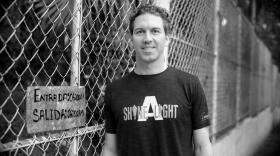-
Juan Martinez on Las Vegas as inspiration for his new novel literalizing the horror of capitalism, trauma, and xenophobia
-
Erin Langner's new collection of essays on escape have much for local readers to enjoy, if they can lower their Las Vegas defenses
-
A brief encounter in Searchlight at the start of a long journey through Nevada.
-
A new book follows people attempting to escape life in LV’s storm drains.
-
A UNLV professor examines the immigration mess as it plays out in the streets and “strip-mall courtrooms” of Las Vegas.
-
In Desert Notebooks, author Ben Ehrenreich ponders the future through the lenses of climate change, the desert, mythology, time — and Las Vegas.
-
A novel based on the PEPCON explosion tells a story that could have happened anywhere.
-
A new book examines the Bundy movement through the lens of Mormonism.
-
A new book takes a deep look at the acclaimed, iconic — and cantankerous — Nevada artist.
-
Two new books of local interest place you at a crossroads. In one direction, Nevada poet Shaun T. Griffin beckons
© All Rights Reserved 2026 | Privacy Policy
Tax ID / EIN: 23-7441306
Tax ID / EIN: 23-7441306

Play Live Radio
Next Up:
0:00
0:00
Available On Air Stations
Supported by








